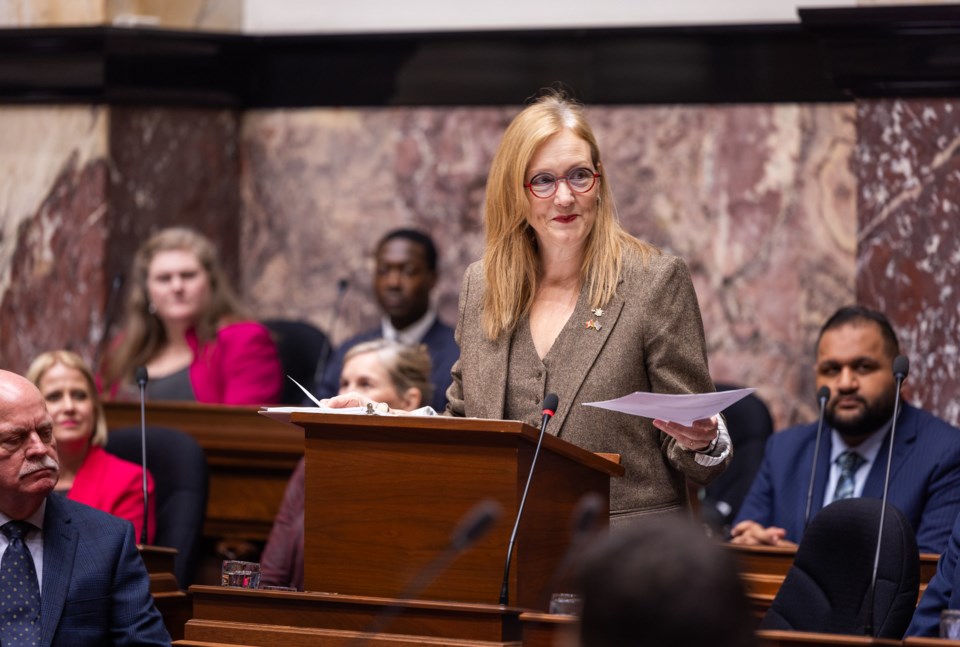There was precious little to brag about in the province’s year-end financials Thursday, not that it stopped the NDP government from trying.
“It's our approach that we are focusing on protecting services for people, the services that are most important to them, while still bringing down costs,” said Finance Minister Brenda Bailey.
The largest deficit in British Columbia history. Debt up 50 per cent in two years. A structural deficit no one’s even pretending to control. Emergency funds raided for day-to-day spending. And multiple credit rating downgrades.
“I intend to change the direction that these credit ratings are going,” said Bailey. “We’re taking this work very seriously. And the work that we're doing on our efficiency review, the work that we're doing on managing government spending, and, very importantly, the work that we're doing on increasing revenue is related to this work as well.”
But the numbers don’t back that up.
The 2024-25 fiscal year closed with a $7.3-billion deficit. That’s a tad less than budgeted, mainly due to investment earnings in places like ICBC. Yet it’s still the largest ever—blowing past the $5.5 billion in red ink the province ran during the height of the global emergency caused by the COVID-19 pandemic.
It’s a wild turnaround from just two years prior, when a departing John Horgan left Premier David Eby a $6-billion surplus that fuelled an Eby-style spendapalooza. The numbers show it hasn’t stopped since. The resulting overspend on programs and services is now baked into the annual budget, leaving it decoupled from the realities of the provincial economy.
To illustrate that point, look no further than the $3.9 billion in contingencies the government set aside for 2024-25.
Typically, contingencies are used to fund emergencies, like wildfires, as well as case pressures in areas like social assistance and child welfare. Just $769 million went to wildfires. A staggering $3.4 billion quietly kept ministries afloat after they overspent or underbudgeted, with no debate in the legislature, no vote by MLAs and no real explanation.
The Ministry of Citizens’ Services ate up $20 million for “enterprise services funding model” and $14 million for “government wide information technology costs”—core functions of the ministry that should be in its budget.
The post-secondary ministry spent $48.5 million on its “Future Ready Action Plan” while the public safety ministry needed $65.5 million extra for “policing and security programs,” but neither were explained to the legislature because contingency funds are just dispersed in secret by cabinet.
And then there’s Government Communications and Public Engagement, the most bloated and hyper-partisan corner of the government, which somehow managed to blow through its $31.6 million budget and snag another $8.8 million from contingencies. The 28 per cent budget overrun was buried in public accounts as vague “staffing pressures” and “operating pressures.”
Fiscal restraint, this is not.
The contingency fund reads like a fever dream from the premier’s office, where political promises, panicked backtracks and policy pivots are all funded with zero scrutiny.
Bailey at one point pinned the blame on U.S. President Donald Trump.
“British Columbia and Canada are not the only jurisdictions that are feeling the impact of the challenges of a slowed global economy and now the impacts of international trade,” she said.
“And so yes, we are experiencing increased debt and that reflects the fact that our government remains committed to ensuring that we support British Columbians and we're going to continue to do that.”
Trump was only president for the final 10 weeks of that fiscal year, ending March 31. The damage was already done through government decisions in the 42 weeks prior.
The financial situation is only going to get worse for the Eby government. The first quarter update for the current 2025-26 budget is set to land in September, where a projected $10.9 billion deficit is expected to balloon due to a $2.8 revenue hit over eliminating the carbon tax, a collapsing real estate market, and actual U.S. tariffs.
Bailey said she’s on track to find $1.5 billion in efficiency savings in the budget over the next three years, during which time she’s also budgeting $31 billion in deficits. It’s like bailing out a flooded bathtub with a shot glass while the tap is still running full blast.
“We have a lot of work to do ahead of us to get back to a path to balance,” Bailey said, adding at one point that “it’s going to take multiple years.”
At this rate, the BC NDP doesn’t just need multiple years. It needs divine intervention.
Rob Shaw has spent more than 17 years covering B.C. politics, now reporting for CHEK News and writing for The Orca/BIV. He is the co-author of the national bestselling book A Matter of Confidence, host of the weekly podcast Political Capital, and a regular guest on CBC Radio.
[email protected]
🚨Newsletter alert! Stay ahead of the curve in B.C. politics. Get expert political analysis delivered straight to your inbox, plus inside scoops and other stories from across the province. Sign up here for the Capital & Coast newsletter.



